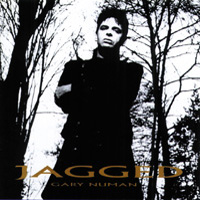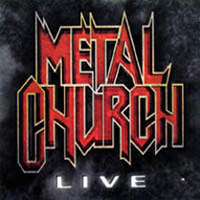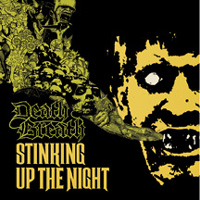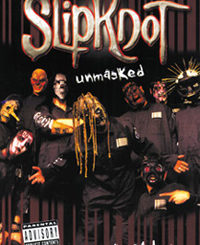 Gary Numan
Gary Numan
Jagged (Metropolis)
An interview with Gary Numan
By Martin Popoff
Gary Numan‘s a damn interesting guy, he looks bloody young for his 48 years, and don’t believe him when he says his “people skills are rubbish.” Furthermore, he’s legend and legion in electronic and Goth music, with such heady status established pretty much before there ever was such a thing, sort of in the nexus between his novel, Tubeway Army, art rock, and, well – curse of curses – his “Cars” hit. He’s recorded only sporadically in the ’00s, with 2000’s Pure being dark, caustic, and quite heavy, and his gleaming new one, Jagged, being a bit more back to the old school synths.
How about a contrast between Jagged and Pure?
There’s a reemphasis on Pure, which is pretty much guitar-driven with electronics, while Jagged is more electronic-driven, with an element of guitars throughout. So there’s a similar road they’re going down; the same road, but a different emphasis. They are definitely linked quite clearly. There’s a clear lineage, ever since Sacrifice in ’94, a sort of learning to do this better here, that there, and getting a little bit heavier and sort of darker with each one too. But Jagged has a simple ambition: I wanted to make the chorus of every song hugely anthemic. I wanted all the choruses to be massive, and I wanted the verses to be gentle, almost depressive, almost in an eerie type of way. I think some criticism I have is that I actually stuck to that too closely, because the songs all do that. It’s a bit of a one-trick pony, really. So I need to be more careful about that next time. But nonetheless, it’s what I intended to do. It’s great live. It works really well live. Epic stuff.
 Why the title Jagged?
Why the title Jagged?
Most of the songs are about the darker side of things I’ve been interested in, or drawn into, over the last 25, 30 years. Since I’ve been doing this for a living, you can imagine, you’re there, you’re introduced to things which got a little bit left of center, and you get drawn into things, and some of them developed to the point where you go, “God, I shouldn’t have done that” or, “That wasn’t what I expected.” Or “That was good fun, and it probably shouldn’t have been.” So it’s a look back at all those moments, really. Almost a diary of shame. But it’s very disguised, and it’s massively magnified to make it seem more than it was. It was just a source, really, to write from. I’ve really only done one or two things that I really shouldn’t have done. Nothing life-threatening, though, or too heavy (laughs), but definitely things that if your mom or dad knew, you’d die.
Tell me about your experience with flying, being a pilot. Did you fly for living?
No, not for a living, it was always a hobby. But I did earn from it, in a limited way. In England, you’re allowed to make money from an airplane, in aerospace, providing you don’t make a profit. For that, you need a commercial license. So for me, it was a hobby. But it did pay for the upkeep of an airplane. I did that for probably ten years, actually. I was an aerobatic display pilot. I flew World War II planes. My airplane was built in Montreal, in ’43. I used to fly with a team, and then that developed into a formation aerobatic duo, and on occasion, we’d fly airplanes for other people. It was great, really exciting.
So you’re not allowed to make a profit, but you can pay for all these exorbitant expenses of running a plane?
Yeah. It was brilliant, absolutely brilliant. It’s a very good way of doing it. It’s a very sensible approach to doing it, when the authorities you see don’t have too many sensible approaches. It actually enables the public to have access to airplanes they otherwise wouldn’t be able to see. And it allowed the pilots who flew them to display them, without going through all the unnecessary rigmarole of actual licensing. Who cares how many life jackets you need on an airplane, if you’re flying a single seat fighter? It’s bollocks. The whole commercial route just didn’t apply to this kind of flying, and obviously the Civil Aviation Authority in Britain realized this and came up with this whole sidestep around it. It was good work, very nice.
 What you do on the road to keep sane?
What you do on the road to keep sane?
Well, I actually enjoy it now a lot more than I used to. In a sense, it’s easier than it ever was before. I’ve been doing it for such a long time that all the stresses and strains, I guess, I can’t even remember them now. It’s fun being here. It’s with people I like; the band are some of my closest friends. We spend time with each other at home. They’re just really good, easy to get along with, an interesting bunch of people to deal with. My wife is with me. It’s all very easy, to be honest. In fact, it makes you wonder why you hear the stories about bands splitting up on tour buses, due to the pressures of the road. We’re in this lovely bus, with my best friends of my life, and we’re traveling around the world, seeing stuff and meeting people every day. And then you go onstage and play your songs to people who like them (laughs). The thing with travel in the early days, I used to get homesick really badly. I used to feel awkward and clumsy on stage, and didn’t feel I was very good on stage, so I was overly aware of that, perhaps. But that was 25, 30 years ago.
Was there drug and drink in the old days? Was there having to go onstage hungover and stuff like that?
I’ve never been drunk. I’m not trying to pretend to be whiter than white, but the thing that happened, when I was at school, I had a lot of trouble at school, and I was sent to a child psychologist to try to figure what was the problem. They put me on these drugs. One was Valium, when I was 15 and 16, and you can’t drink when you’re on those, apparently. Your head falls off, or something like that. And so when my friends were going out and experimenting with drink and kind of forcing themselves to like it, I wasn’t able to. Not that I wanted to, but I wouldn’t have been able to anyway. I was never one to bow down to peer pressure. But I don’t think I would’ve done it anyway. The years went past, and there are all these drugs as part of the game, and I was able to witness all my friends getting drunk and doing all those things that happen when you get drunk, and I was thinking, “That’s just… ridiculous.” So I never got into it. Never actually drank a glass of beer in my life.
Do you have any interesting stories about the early characters in the punk movement? Did you know the bands?
Not all of them, only some of them. I came in at the tail end of it, really. I’ve met like Dave Elliott, Rat Scabies, some of these people. Steve Jones and Matlock. Quite a few of them, I guess. I was playing with it, rather than leading a serious punk rocker life. I got a punk rock band together because everybody was getting signed up. If you were a punk rock band, it was easy to get a contract. So I was using punk as a mercenary stepping-stone to get somewhere else.
 Did you appreciate punk, or were you trying to bury it?
Did you appreciate punk, or were you trying to bury it?
I didn’t appreciate punk musically. I thought it sucked, and I still do. Musically, it was bollocks. But as an attitude, and as a catalyst, it just shook everything down to the core. I remember being at a Sex Pistols gig, a couple years before I was making records, and in the audience were Siouxsie and The Banshees, Adam and The Ants, God knows who else. The A to Z of all the stars that were ever going to kind of come about in the next ten years. So there were a lot of people into it, watching it, and making their own plans about what they were going to do with it. So it seemed to me, anyway.
By the time I started to make records in ’78, it was already obvious to me that the whole punk thing, at least in the UK, was dying. And if you did that, to any great degree, you were just going to fade away with it. As these things come and go, they tend to take the fans with them. Very few bands come out of these periods and continue. So a lot of it comes down to the record company. The band, actually, were reluctant to move away from punk, so it was a bit frustrating. The label sent me in to make my first so-called punk album, and I came back with this pseudo semi-electronic album, and they went mental, absolutely mental. T hey saw nothing in it whatsoever. Punk this and punk that. I was like, “If you can’t see it finished, you’re blind! It’s absolutely finished. It’s had its moment. It’s done what it’s going to do, and all you’ve got now is everyone else who is jumping on the bandwagon, and it’s too late. Let’s think forward here. Because this, I think, is going to be massive. It’s going to make punk look like a stepping stone, and this will last. This isn’t just playing music in a slightly different way. This is an entirely new way of thinking about making music. It’s a big step.” The thing that saved me, was that the record company was so poor, which would normally be a disadvantage, but they couldn’t afford to send me back into the studio and force me to make the punk album that they sent me in to do. So they had to release the electronic album I came back with. And it did well. Nothing massive, but better than they thought. One of the people at the record company saw it, and started to see what I was talking about. And the other one didn’t, but he left. If they’d been a slightly more funded record label, they probably would’ve forced me to go back and do the punk album, and that would’ve been it for me.
Over the course of your career, besides this instance, did you ever have the label or management ask you to do stupid things, where you just rolled your eyes? You know, duets, covers, publicity stunts?
I was very good at fending off all of that, for the first few years, but then I guess around ’83, ’84, my career started to slide quite badly, and you’re kind of bullied, almost blackmailed, into starting to go along with some of these crap ideas, like doing Prince covers. And to my shame, I didn’t say “That’s just not right; I’m not doing that,” because I’d actually lost all my confidence. Things were going so badly. Decisions that I was making were no longer working out for me, so I really lost faith in my ability to read the business, whereas I thought I’d done that quite well before. I lost faith in the music I was writing. I didn’t even like most of it, eventually. I just didn’t have this blinkered tunnel vision about where I was going, and nothing else was going to swerve me from that. That kind of faded away, so you start to compromise. The record company would say, “We think you should do this, this, and this, and if you don’t, we’re not going to devote any promotional budget to this record whatsoever.” So they write you off, effectively. You end up playing this political cat dance, where you’re trying to do enough to keep them happy, and enough to do what you want to do. You just get sucked into it, and before you know it, you’ve lost all sense of direction. You don’t know how you want to sound, you don’t know how you want to look. You’ve wandered off the road that you’ve been so religiously stuck to. The clear vision is gone. Fucking advice. Good advice which is far from good advice. Everyone knows best. When your career is doing really well, everyone discovered you. When you’re not doing well, everyone knows what you should be doing. Everyone who has never done it themselves. You just have to live through it, I think. If you’re lucky, in the end, you find your road again. Myself, come ’94, I probably stumbled back across my road, and here I am. I’m back. I lost my way, but now I found it again. This music is not particularly commercial, it doesn’t get played on the radio, but I really love it. I’m very happy with what we’re doing. My songwriting has improved enormously. I was very happy with my first few, that bit in the middle not so great, but I’m happy again now.
Are there other things you’d like to accomplish in life, other artistic things?
Writing. I’d like to write. Novels, sci-fi, fantasy kind of stuff.
Have you tried it?
Loads and loads of attempts to get going, but as long as I’m doing this, it’s very difficult to do both. I’ve never written books, so I’m not the best judge, but it seems to me you really need to shut yourself away and immerse yourself in whatever world you’re trying to create, just create those pictures, live it as much as you can, and think that way. Method writing. I’m not able to do that in my world. My vision is when I’m 60 years old, living in Cornwall, near the coast, with my pipe, in front of an open fireplace, writing about people who fight with swords. I love the idea of it. A technology-free environment, that’s what I like to write about. It’s really appealing. It’s strange: When you read about a time when they had no technology, words like honor were in common use. There must be a connection between this loss of decency and honor, and technology. I don’t know what it is, but there has to be a connection.
(www.metropolis-records.com)



